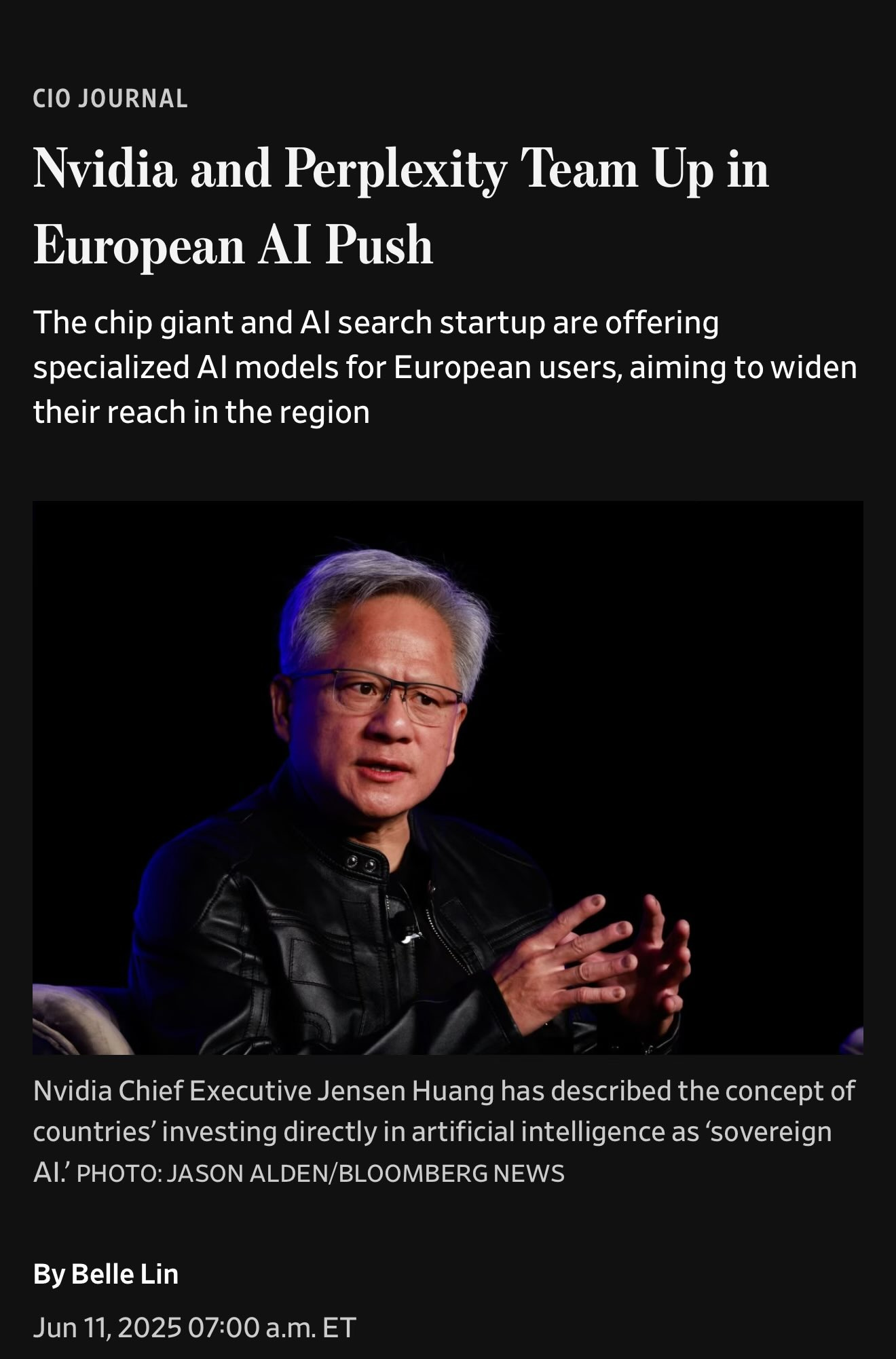Nvidia-Perplexity AI Partnership: A Strategic Challenge to Google’s European Dominance
Will the new partnership rock the Google Titanic?
Karan Bir Singh Sidhu is a retired Indian Administrative Service (IAS) officer of the Punjab cadre, having served as Special Chief Secretary, Government of Punjab. A gold medallist graduate in Electronics and Communication Engineering, he also holds a Master’s degree in Economics from the University of Manchester, UK. KBS Sidhu actively engages in policy analysis and writes extensively on technology trends, artificial intelligence regulation, and geo-strategic affairs, focusing on their impact on governance and international dynamics.
Nvidia-Perplexity Announce AI Partnership
On June 11, 2025, Nvidia and Perplexity announced a groundbreaking partnership aimed at developing sovereign large language AI models specifically tailored to European languages and cultures. The announcement, made during Nvidia’s GPU Technology Conference (GTC) in Paris, has marked a significant strategic development with implications for Google’s long-standing dominance in European search and AI services.
At the helm of this partnership are Nvidia CEO Jensen Huang and Perplexity CEO Aravind Srinivas, who has been instrumental in positioning Perplexity as a leading AI-driven answer engine. Srinivas, of Indian origin, underscored the strategic importance of Germany—already Perplexity's second-largest market by revenue—and the potential for further expansion across Europe.
Scope and Significance of the Partnership
The Nvidia-Perplexity initiative involves collaboration with notable European institutions such as the Barcelona Supercomputing Center, Bielik.AI, H Company, LightOn, and the Technology Innovation Institute. Together, they aim to create locally optimized AI models addressing Europe's complex linguistic landscape, covering all 24 official EU languages. These models will be hosted on Nvidia's DGX Cloud Lepton marketplace, supported by European cloud infrastructure providers including Nebius, Nscale, and Fluidstack.
Perplexity, valued at approximately $14 billion, currently answers over 150 million queries weekly. Its conversational and direct-answer model contrasts sharply with Google's traditional search approach reliant heavily on click-based advertising revenue.
Impact on Google’s Market Position
Google currently dominates Europe's search engine market, controlling around 89% across devices and over 94% on mobile. However, the partnership between Nvidia and Perplexity could pose a significant competitive threat. By leveraging localized, culturally nuanced AI models, Perplexity aims to resonate deeply with European users who are increasingly mindful of data sovereignty and privacy.
The partnership directly addresses European regulatory concerns around data localization and technological dependency. With AI spending in Europe projected to reach nearly $145 billion by 2028, Nvidia and Perplexity are strategically positioned to tap into a lucrative market where local compliance and cultural alignment matter significantly.
Disruption of Google’s Revenue Model
Perhaps the most disruptive aspect of this partnership for Google is its potential to shift user behavior away from traditional click-based searches towards conversational, direct-answer AI interactions. Google's massive advertising revenue, totaling over $72 billion in Q4 of 2023 alone, could face significant pressure if users increasingly adopt AI-driven platforms that provide immediate answers without necessitating additional clicks.
This disruption was candidly articulated by Perplexity’s CEO Srinivas, who highlighted the inherent challenge for traditional ad-based revenue models when direct AI answers eliminate the need for further user interaction. He had earlier expressed these views in the TED AI Podcast, hosted by our honorary Tech Adviser, Bilawal Sidhu, who is based out of Austin, Texas.
Regulatory Pressures Amplifying Competitive Threats
Google’s position is further complicated by intensified regulatory scrutiny. The European Union, through actions such as the Digital Markets Act (DMA), continues to impose heavy antitrust penalties on Google, cumulatively exceeding €8 billion. Recent rulings in the EU and the U.S. have reinforced the view that Google’s search monopoly has been maintained through questionable practices.
Google’s Strategic Response
Google is actively responding by introducing AI-generated search result overviews across multiple European countries. However, experts view these as incremental adaptations rather than transformative shifts. Google's entrenched reliance on advertising revenue significantly restricts its capacity to fully embrace AI-first models without fundamentally altering its business strategy.
Broader Implications and Future Outlook
While Google's search volumes continue to grow, subtle shifts in user behavior, notably the declining search volumes on platforms such as Apple's Safari browser, indicate a broader industry trend toward AI-powered alternatives. This shift could potentially weaken Google's dominance in the long term.
The Nvidia-Perplexity partnership represents a broader paradigm shift towards AI services emphasizing local sovereignty, regulatory compliance, and cultural relevance. For Google, this necessitates not only technological innovation but also strategic recalibration to navigate an increasingly competitive and regulation-intensive environment.
Conclusion
The strategic partnership between Nvidia and Perplexity underscores a pivotal moment for the AI and search industry in Europe. With local sovereignty and cultural alignment at its core, this collaboration challenges Google’s entrenched market position. Google's response—whether incremental or transformative—will significantly shape the future landscape of digital search and AI services in Europe.





